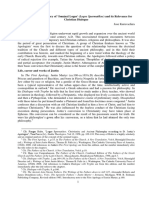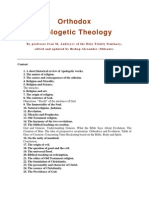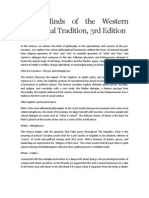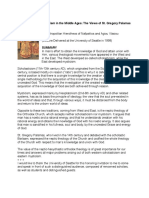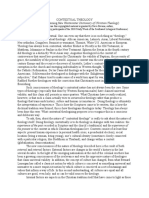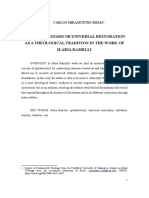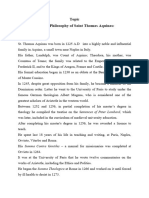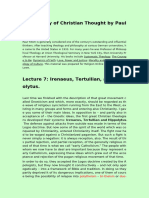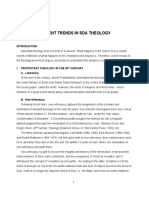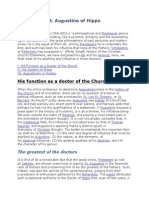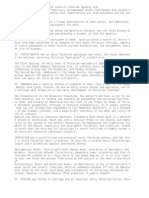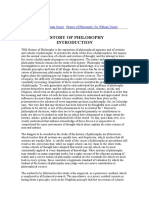Philosophy of St.
Philosophy of St.
Uploaded by
Jhe SorianoCopyright:
Available Formats
Philosophy of St.
Philosophy of St.
Uploaded by
Jhe SorianoCopyright
Available Formats
Share this document
Did you find this document useful?
Is this content inappropriate?
Copyright:
Available Formats
Philosophy of St.
Philosophy of St.
Uploaded by
Jhe SorianoCopyright:
Available Formats
ST.
AUGUSTINE OF HIPPO
Aurelius Augustinus [more commonly St. Augustine of Hippo, often simply Augustine ] (354 430 C.E.): rhetor, Christian Neoplatonist, North African Bishop, Doctor of the Roman Catholic Church. One of the decisive developments in the western philosophical tradition was the eventually widespread merging of the Greek philosophical tradition and the Judeo-Christian religious and scriptural traditions. Augustine is one of the main figures through and by whom this merging was accomplished. He is, as well, one of the towering figures of medieval philosophy whose authority and thought came to exert a pervasive and enduring influence well into the modern period (e.g. Descartes and especially Malebranche), and even up to the present day, especially among those sympathetic to the religious tradition which he helped to shape (e.g. Plantinga 1992; Adams 1999). But even for those who do not share this sympathy, there is much in Augustine's thought that is worthy of serious philosophical attention. Augustine is not only one of the major sources whereby classical philosophy in general and Neoplatonism in particular enter into the mainstream of early and subsequent medieval philosophy, but there are significant contributions of his own that emerge from his modification of that Greco-Roman inheritance, e.g., his subtle accounts of belief and authority, his account of knowledge and illumination, his emphasis upon the importance and centrality of the will, and his focus upon a new way of conceptualizing the phenomena of human history, just to cite a few of the more conspicuous examples. 1. Context 2. Reading The Confessions 3. The Mysterious Woman From Northern Africa 4. Ontology and Eudaimonism 5. Philosophical Anthropology 6. Psychology and Epistemology 7. Will 8. History and Eschatology 9. Legacy Bibliography Selected Latin Texts and Critical Editions Selected English Translations Selected General Studies Selected Secondary Works Other Internet Resources Related Entries
ST.ANSELM OF CANTERBURY
Anselm was one of the most important Christian thinkers of the eleventh century. He is most famous in philosophy for having discovered and articulated the so-called ontological argument; and in theology for his doctrine of the atonement. However, his work extends to many other important philosophical and theological matters, among which are: understanding the aspects and the unity of the divine nature; the extent of our possible knowledge and understanding of the divine nature; the complex nature of the will and its involvement in free choice; the interworkings of human willing and action and divine grace; the natures of truth and justice; the natures and origins of virtues and vices; the nature of evil as negation or privation; and the condition and implications of original sin. In the course of his work and thought, unlike most of his contemporaries, Anselm deployed argumentation that was in most respects only indirectly dependent on Sacred Scripture, Christian doctrine, and tradition. Anselm also developed sophisticated analyses of the language used in discussion and investigation of philosophical and theological issues, highlighting the importance of focusing on the meaning of the terms used rather than allowing oneself to be misled by the verbal forms, and examining the adequacy of the language to the objects of investigation, particularly to the divine nature. In addition, in his work he both discussed and exemplified the resolution of apparent contradictions or paradoxes by making appropriate distinctions. For these reasons, one title traditionally accorded him is the Scholastic Doctor, since his approach to philosophical and theological matters both represents and contributed to early medieval Christian Scholasticism. TABLE OF CONTENT Life Influences Methodology: Faith and Reason The Proslogion Gaunilos Reply and Anselms Response The Monologion Cur Deus Homo De Grammatico The De Veritate The De Libertate Arbitrii The De Casu Diaboli
The De Concordia The Fragments Other Writings References and Further Readings Primary Sources Secondary Sources
ST.THOMAS AQUINAS
Thomas Aquinas (1225 1274) lived at a critical juncture of western culture when the arrival of the Aristotelian corpus in Latin translation reopened the question of the relation between faith and reason, calling into question the modus vivendi that had obtained for centuries. This crisis flared up just as universities were being founded. Thomas, after early studies at Montecassino, moved on to the University of Naples, where he met members of the new Dominican Order. It was at Naples too that Thomas had his first extended contact with the new learning. When he joined the Dominican Order he went north to study with Albertus Magnus, author of a paraphrase of the Aristotelian corpus. Thomas completed his studies at the University of Paris, which had been formed out of the monastic schools on the Left Bank and the cathedral school at Notre Dame. In two stints as a regent master Thomas defended the mendicant orders and, of greater historical importance, countered both the Averroistic interpretations of Aristotle and the Franciscan tendency to reject Greek philosophy. The result was a new modus vivendibetween faith and philosophy which survived until the rise of the new physics. The Catholic Church has over the centuries regularly and consistently reaffirmed the central importance of Thomas's work for understanding its teachings concerning the Christian revelation, and his close textual commentaries on Aristotle represent a cultural resource which is now receiving increased recognition. The following account concentrates on Thomas the philosopher. 1. Life and Works 1.1 Vita Brevis 1.2 Education 1.3 Writings 2. Philosophy and Theology 3. Christian Philosophy 4. Thomas and Aristotle 5. The Order of Philosophical Inquiry 6. Composition of Physical Objects 6.1 Matter and Form 6.2 Substantial Change 7. Perception and Thought 8. Body and Soul 9. Beyond Physics 10. Philosophical and Scriptural Theology 10.1 God 10.2 Analogous Names 10.3 Essence and Existence 11. Moral Doctrine 11.1 Natural Law 12. Thomism Bibliography Life and Works Primary Literature Introductions Specialized Studies Thomism Electronic Databases Other Internet Resources Related Entries
You might also like
- Justin Martyrs Theory of Seminal Logos ADocument11 pagesJustin Martyrs Theory of Seminal Logos ARene OliverosNo ratings yet
- Orthodox Apologetic Theology - I.M. Andreev - Bp. AlexanderDocument112 pagesOrthodox Apologetic Theology - I.M. Andreev - Bp. Alexanderikonographics100% (3)
- Luther and Late Medieval Thomism: A Study in Theological AnthropologyFrom EverandLuther and Late Medieval Thomism: A Study in Theological AnthropologyRating: 5 out of 5 stars5/5 (1)
- Great Minds of The Western Intellectual TraditionDocument14 pagesGreat Minds of The Western Intellectual TraditionAbraham D. Delgado EscalanteNo ratings yet
- Rationalism and Mysticism PDFDocument11 pagesRationalism and Mysticism PDFMircea George PopandronNo ratings yet
- A Note On African TheologyDocument7 pagesA Note On African TheologyestifanostzNo ratings yet
- Thomas Aquinas and Augustine S PhilosophiesDocument18 pagesThomas Aquinas and Augustine S PhilosophiesTeacheer Dan100% (1)
- Report 1Document2 pagesReport 1Joash Raj ChavakulaNo ratings yet
- A Saint for East and West: Maximus the Confessor’s Contribution to Eastern and Western Christian TheologyFrom EverandA Saint for East and West: Maximus the Confessor’s Contribution to Eastern and Western Christian TheologyNo ratings yet
- Exclusively Intended For Use by Participants of The 2010 Study Week of The Southwest Liturgical Conference)Document5 pagesExclusively Intended For Use by Participants of The 2010 Study Week of The Southwest Liturgical Conference)Hugo MartinNo ratings yet
- Thomas Aquinas PhilosophyDocument5 pagesThomas Aquinas Philosophyapi-284300846No ratings yet
- Rainbow Mission Theological SeminaryDocument21 pagesRainbow Mission Theological SeminaryShekinah Love MedallaNo ratings yet
- Apokatastasis or Universal Restoration As A Theological Tradition in The Work of Ilaria RamelliDocument46 pagesApokatastasis or Universal Restoration As A Theological Tradition in The Work of Ilaria RamelliTheKarlos1212No ratings yet
- L 06 - Text200314070703032222Document14 pagesL 06 - Text200314070703032222YátêndråRäwâtNo ratings yet
- Georges Florovsky, The Eastern Fathers of The Fourth Century, Vol. 7, 1978Document243 pagesGeorges Florovsky, The Eastern Fathers of The Fourth Century, Vol. 7, 1978Constantin Balasoiu100% (2)
- Lecture 7Document9 pagesLecture 7Chii Ing WongNo ratings yet
- Unitas in Latin Antiquity The Contribution of CyprianDocument211 pagesUnitas in Latin Antiquity The Contribution of CyprianIvan Marija TomićNo ratings yet
- Medieval PhilosophyDocument40 pagesMedieval PhilosophyRafaelDelaCruzNo ratings yet
- Theologies of the 21st Century: Trends in Contemporary TheologyFrom EverandTheologies of the 21st Century: Trends in Contemporary TheologyNo ratings yet
- Issues in SDA Theology Pfandl 1Document101 pagesIssues in SDA Theology Pfandl 1Margareta Pgm50% (2)
- Teaching of St. Augustine of Hippo: His Function As A Doctor of The ChurchDocument33 pagesTeaching of St. Augustine of Hippo: His Function As A Doctor of The Churchjanelle1301No ratings yet
- Summary of Psych in Middle AgesDocument2 pagesSummary of Psych in Middle AgesBenita SumitaNo ratings yet
- Charred Root of Meaning: Continuity, Transgression, and the Other in Christian TraditionFrom EverandCharred Root of Meaning: Continuity, Transgression, and the Other in Christian TraditionNo ratings yet
- CivicsDocument3 pagesCivicsMartina StaviarskaNo ratings yet
- Father Hardon Lifetime Reading ListDocument18 pagesFather Hardon Lifetime Reading Listwerdegast100% (2)
- Prepare A Short Biography and A List of Philosophical Tenets of St. Thomas AquinasDocument10 pagesPrepare A Short Biography and A List of Philosophical Tenets of St. Thomas Aquinashenriel tambioNo ratings yet
- The Therapy of Desire: Theory and Practice in Hellenistic EthicsFrom EverandThe Therapy of Desire: Theory and Practice in Hellenistic EthicsRating: 4.5 out of 5 stars4.5/5 (5)
- Report 5Document3 pagesReport 5Joash Raj ChavakulaNo ratings yet
- ApologeticsDocument112 pagesApologeticsJandreadisNo ratings yet
- (Oxford World's Classics) Aristotle (Author), Fred D. Miller, Jr. (Translator) - On The Soul - and Other Psychological works-OUP Oxford (2018)Document445 pages(Oxford World's Classics) Aristotle (Author), Fred D. Miller, Jr. (Translator) - On The Soul - and Other Psychological works-OUP Oxford (2018)Julia100% (5)
- Individuality in Late Antiquity PDFDocument205 pagesIndividuality in Late Antiquity PDFelizzardom100% (4)
- The Eastern Fathers of The Fourth Century.: George FlorovskyDocument173 pagesThe Eastern Fathers of The Fourth Century.: George Florovskypezzilla100% (3)
- Resurrection, Apocalypse, and the Kingdom of Christ: The Eschatology of Thomas F. TorranceFrom EverandResurrection, Apocalypse, and the Kingdom of Christ: The Eschatology of Thomas F. TorranceNo ratings yet
- 1st Quarter Performance TaskDocument16 pages1st Quarter Performance TaskMarvin Jayson M. PasaanNo ratings yet
- Thomas AquinasDocument3 pagesThomas Aquinasgh ghNo ratings yet
- Neoplatonism and ChristianityDocument19 pagesNeoplatonism and ChristianityNathan HolzsterlNo ratings yet
- American ThoughtsDocument12 pagesAmerican Thoughtsdevientart.meNo ratings yet
- From Ancient To Medieval PhilosophyDocument2 pagesFrom Ancient To Medieval PhilosophyBonnie De GuzmanNo ratings yet
- Module 3 - Medieval PhilosophyDocument6 pagesModule 3 - Medieval PhilosophyJanet PaggaoNo ratings yet
- Ethical Principles of ScholasticDocument7 pagesEthical Principles of ScholasticBhanuNo ratings yet
- Studies in World Christianity AmaladossDocument3 pagesStudies in World Christianity AmaladossPsalmist SpursNo ratings yet
- 20 Major PhilosophersDocument11 pages20 Major PhilosophersJael Grace BascunaNo ratings yet
- Personal JourneyDocument14 pagesPersonal JourneyJeremiah Clemente dC TorresNo ratings yet
- List BooksDocument22 pagesList BooksNishant Thakkar100% (1)
- Why Resurrection?: An Introduction to the Belief in the Afterlife in Judaism and ChristianityFrom EverandWhy Resurrection?: An Introduction to the Belief in the Afterlife in Judaism and ChristianityNo ratings yet
- CHS102 - Portfolio of Evidence - Shane Nataneal KokDocument16 pagesCHS102 - Portfolio of Evidence - Shane Nataneal Kokshane.kok44No ratings yet
- Jacques Maritain CenterDocument17 pagesJacques Maritain CenterghiillyrammoneNo ratings yet
- Medieval PhilosophyDocument52 pagesMedieval PhilosophyMelkamNo ratings yet
- PHL342Document147 pagesPHL342Ümit YılmazNo ratings yet
- An Invitation to Analytic Christian TheologyFrom EverandAn Invitation to Analytic Christian TheologyRating: 4 out of 5 stars4/5 (1)
- Medieval ThoughtsDocument10 pagesMedieval ThoughtsgerardpaulgaleraNo ratings yet
- Receiving 2 Thessalonians: Theological Reception Aesthetics from the Early Church to the ReformationFrom EverandReceiving 2 Thessalonians: Theological Reception Aesthetics from the Early Church to the ReformationNo ratings yet
- Theologist of All TimesDocument2 pagesTheologist of All TimesNavi VojNo ratings yet
- Western PhilosophyDocument23 pagesWestern PhilosophyDiona AgripaNo ratings yet
- Methodology: This Piece of Work Will Take The Path of Orthopraxy, Analyzing The PointsDocument13 pagesMethodology: This Piece of Work Will Take The Path of Orthopraxy, Analyzing The PointsdansmonkiNo ratings yet
